Unit 2 Topic 2 I must ask him to give up smoking.重点知识 仁爱科普版英语八年级上册
文档属性
| 名称 | Unit 2 Topic 2 I must ask him to give up smoking.重点知识 仁爱科普版英语八年级上册 |
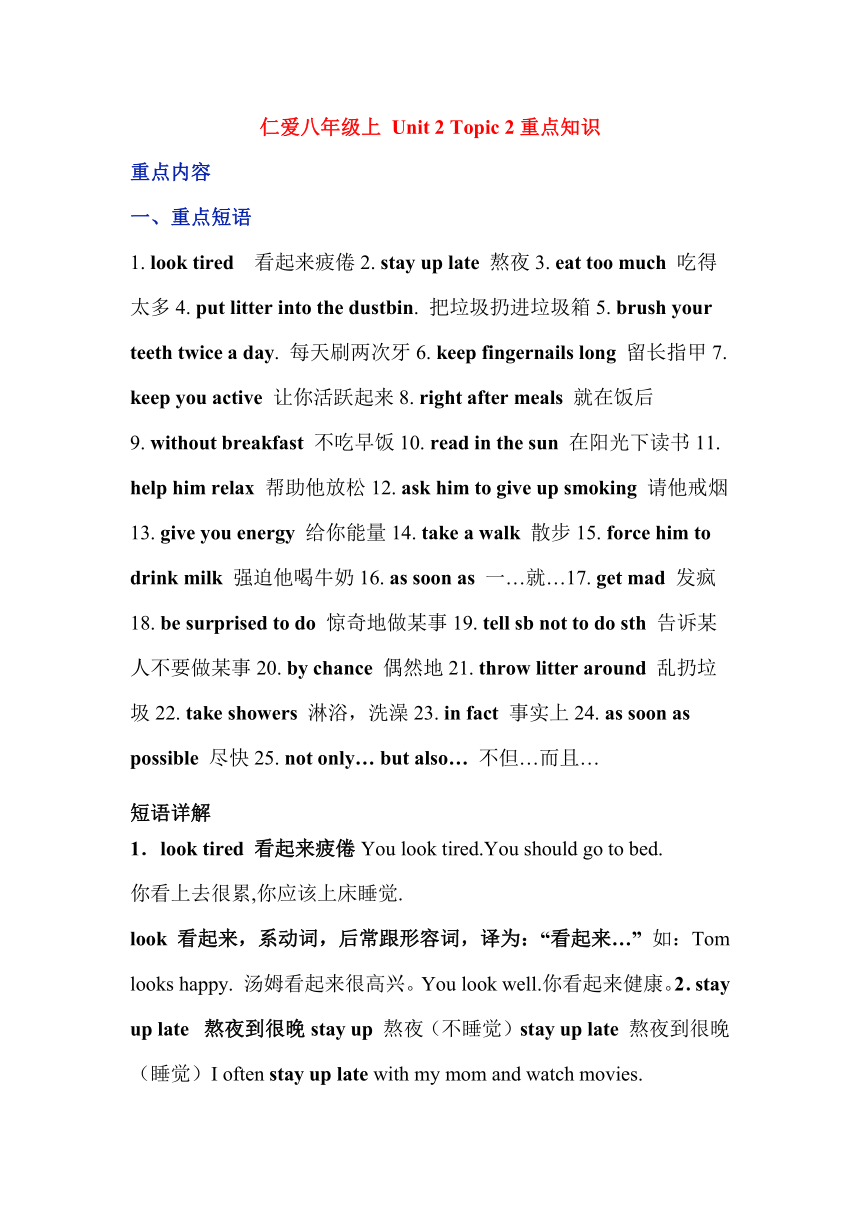
|
|
| 格式 | docx | ||
| 文件大小 | 40.0KB | ||
| 资源类型 | 教案 | ||
| 版本资源 | 仁爱科普版 | ||
| 科目 | 英语 | ||
| 更新时间 | 2024-12-30 17:57:57 | ||
图片预览

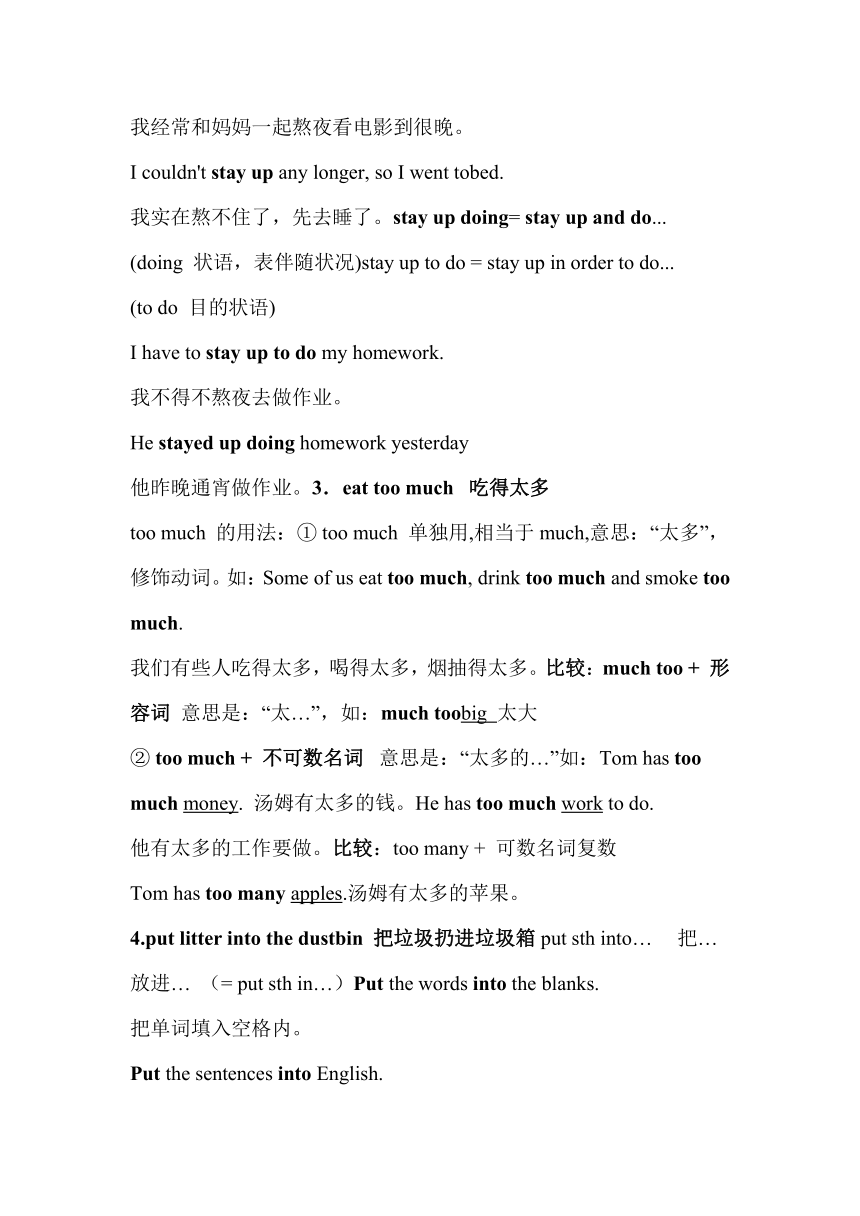
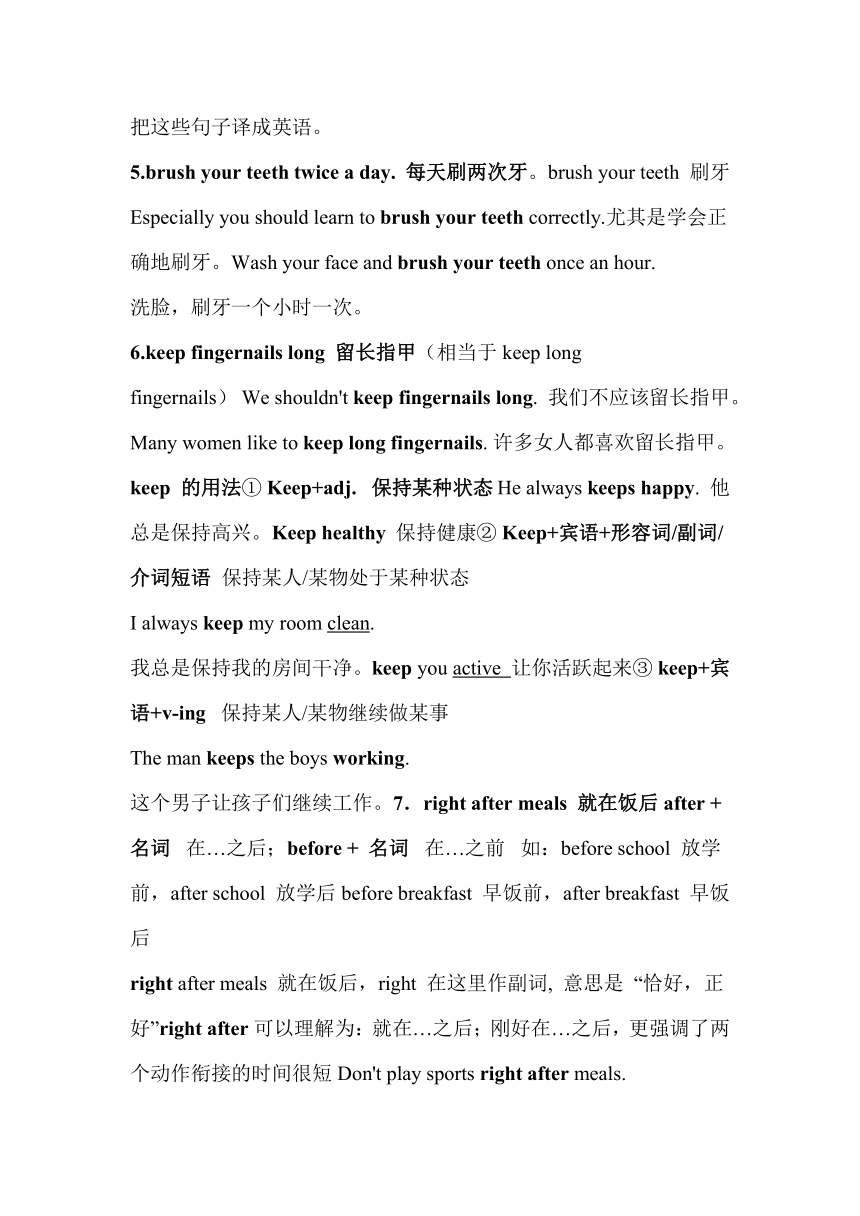
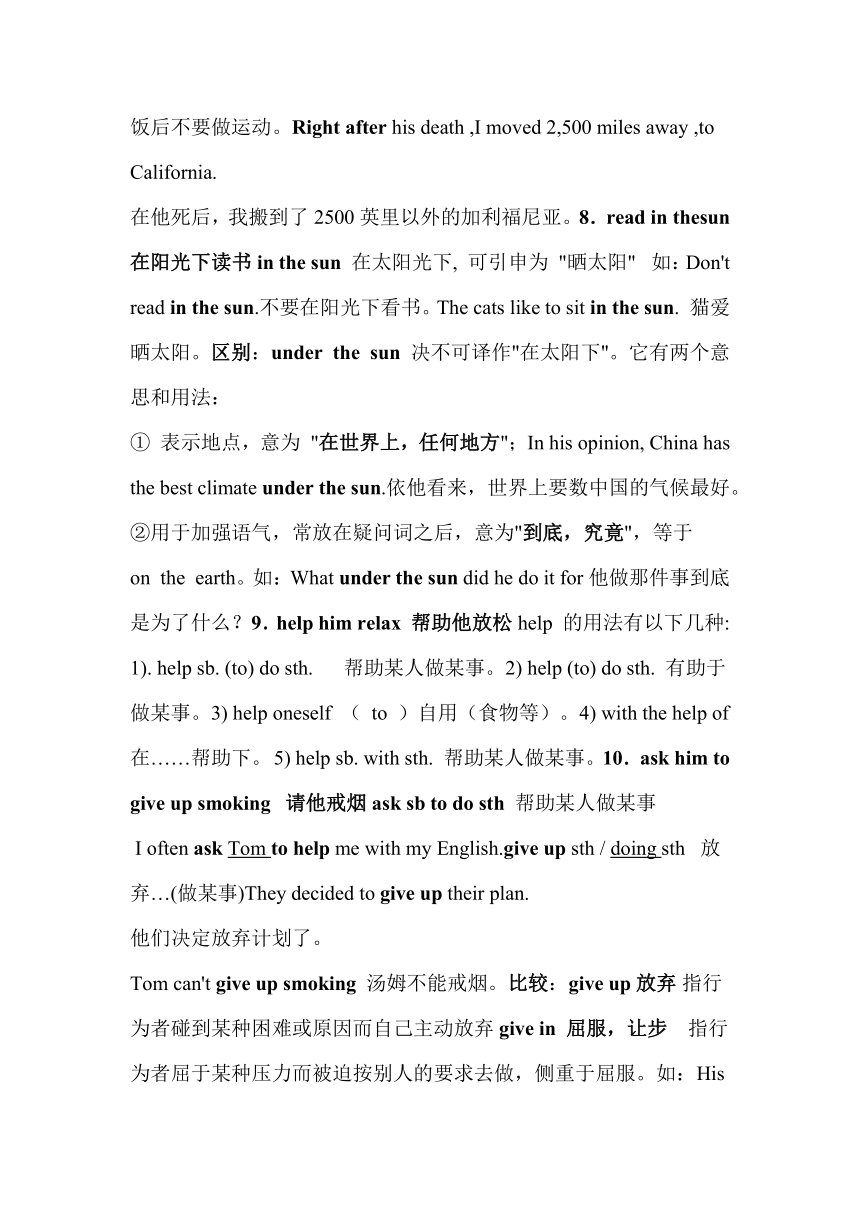
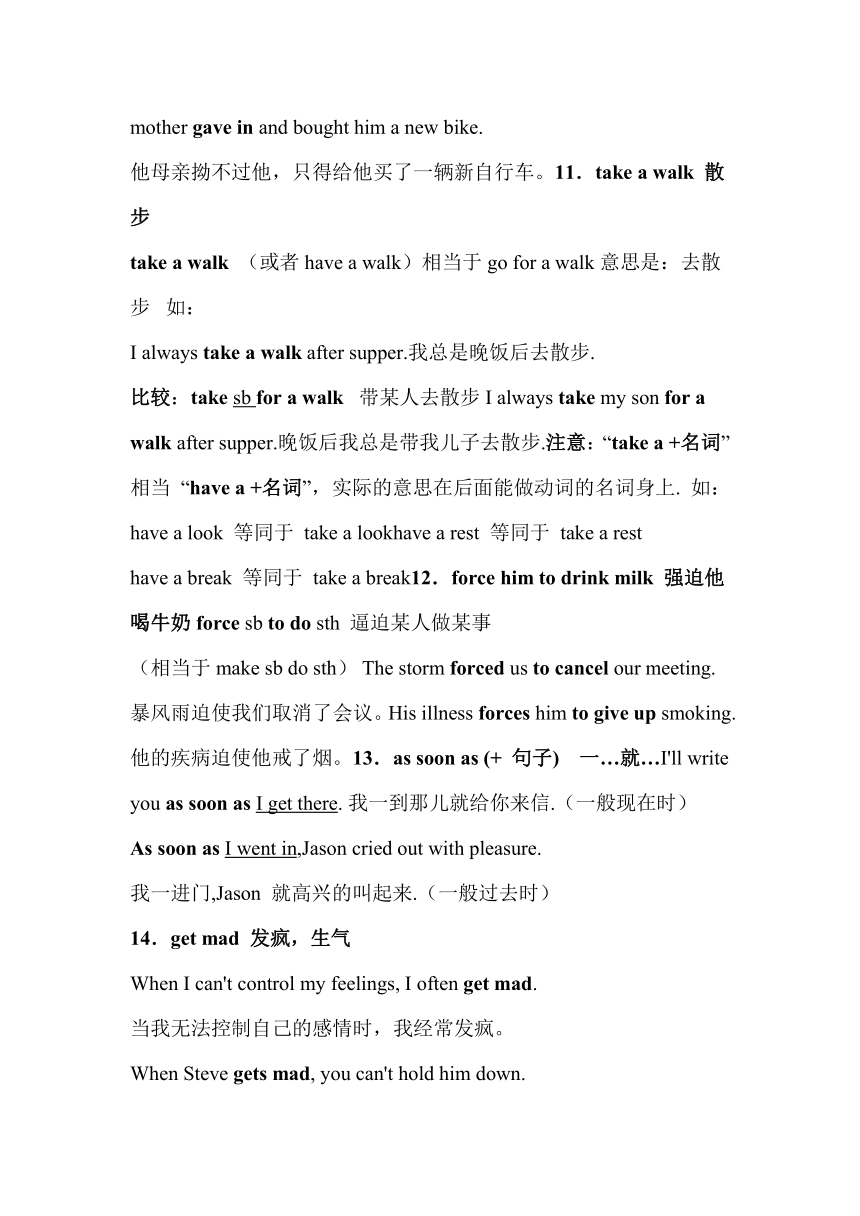
文档简介
仁爱八年级上 Unit 2 Topic 2重点知识
重点内容
一、重点短语
1. look tired 看起来疲倦2. stay up late 熬夜3. eat too much 吃得太多4. put litter into the dustbin. 把垃圾扔进垃圾箱5. brush your teeth twice a day. 每天刷两次牙6. keep fingernails long 留长指甲7. keep you active 让你活跃起来8. right after meals 就在饭后9. without breakfast 不吃早饭10. read in the sun 在阳光下读书11. help him relax 帮助他放松12. ask him to give up smoking 请他戒烟13. give you energy 给你能量14. take a walk 散步15. force him to drink milk 强迫他喝牛奶16. as soon as 一…就…17. get mad 发疯18. be surprised to do 惊奇地做某事19. tell sb not to do sth 告诉某人不要做某事20. by chance 偶然地21. throw litter around 乱扔垃圾22. take showers 淋浴,洗澡23. in fact 事实上24. as soon as possible 尽快25. not only… but also… 不但…而且…
短语详解
1.look tired 看起来疲倦You look tired.You should go to bed.
你看上去很累,你应该上床睡觉.
look 看起来,系动词,后常跟形容词,译为:“看起来…” 如:Tom looks happy. 汤姆看起来很高兴。 You look well.你看起来健康。2.stay up late 熬夜到很晚stay up 熬夜(不睡觉)stay up late 熬夜到很晚(睡觉)I often stay up late with my mom and watch movies.
我经常和妈妈一起熬夜看电影到很晚。
I couldn't stay up any longer, so I went tobed.
我实在熬不住了,先去睡了。stay up doing= stay up and do...
(doing 状语,表伴随状况)stay up to do = stay up in order to do...
(to do 目的状语)
I have to stay up to do my homework.
我不得不熬夜去做作业。
He stayed up doing homework yesterday
他昨晚通宵做作业。3.eat too much 吃得太多
too much 的用法:① too much 单独用,相当于much,意思:“太多”,修饰动词。如:Some of us eat too much, drink too much and smoke too much.
我们有些人吃得太多,喝得太多,烟抽得太多。比较:much too + 形容词 意思是:“太…”,如:much toobig 太大
② too much + 不可数名词 意思是:“太多的…”如:Tom has too much money. 汤姆有太多的钱。He has too much work to do.
他有太多的工作要做。比较:too many + 可数名词复数
Tom has too many apples.汤姆有太多的苹果。
4.put litter into the dustbin 把垃圾扔进垃圾箱put sth into… 把…放进… (= put sth in…)Put the words into the blanks.
把单词填入空格内。
Put the sentences into English.
把这些句子译成英语。
5.brush your teeth twice a day. 每天刷两次牙。brush your teeth 刷牙
Especially you should learn to brush your teeth correctly.尤其是学会正确地刷牙。Wash your face and brush your teeth once an hour.
洗脸,刷牙一个小时一次。
6.keep fingernails long 留长指甲(相当于keep long fingernails) We shouldn't keep fingernails long. 我们不应该留长指甲。
Many women like to keep long fingernails. 许多女人都喜欢留长指甲。
keep 的用法① Keep+adj. 保持某种状态He always keeps happy. 他总是保持高兴。Keep healthy 保持健康② Keep+宾语+形容词/副词/介词短语 保持某人/某物处于某种状态
I always keep my room clean.
我总是保持我的房间干净。keep you active 让你活跃起来③ keep+宾语+v-ing 保持某人/某物继续做某事
The man keeps the boys working.
这个男子让孩子们继续工作。7.right after meals 就在饭后after +名词 在…之后;before + 名词 在…之前 如:before school 放学前,after school 放学后before breakfast 早饭前,after breakfast 早饭后
right after meals 就在饭后,right 在这里作副词, 意思是 “恰好,正好”right after可以理解为:就在…之后;刚好在…之后,更强调了两个动作衔接的时间很短Don't play sports right after meals.
饭后不要做运动。Right after his death ,I moved 2,500 miles away ,to California.
在他死后,我搬到了2500英里以外的加利福尼亚。8.read in thesun 在阳光下读书in the sun 在太阳光下, 可引申为 "晒太阳" 如:Don't read in the sun.不要在阳光下看书。The cats like to sit in the sun. 猫爱晒太阳。区别:under the sun 决不可译作"在太阳下"。它有两个意思和用法:
① 表示地点,意为 "在世界上,任何地方";In his opinion, China has the best climate under the sun.依他看来,世界上要数中国的气候最好。②用于加强语气,常放在疑问词之后,意为"到底,究竟",等于on the earth。如:What under the sun did he do it for他做那件事到底是为了什么?9.help him relax 帮助他放松help 的用法有以下几种:
1). help sb. (to) do sth. 帮助某人做某事。2) help (to) do sth. 有助于做某事。3) help oneself ( to )自用(食物等)。4) with the help of 在……帮助下。 5) help sb. with sth. 帮助某人做某事。10.ask him to give up smoking 请他戒烟 ask sb to do sth 帮助某人做某事
I often ask Tom to help me with my English.give up sth / doing sth 放弃…(做某事)They decided to give up their plan.
他们决定放弃计划了。
Tom can't give up smoking 汤姆不能戒烟。比较:give up 放弃 指行为者碰到某种困难或原因而自己主动放弃give in 屈服,让步 指行为者屈于某种压力而被迫按别人的要求去做,侧重于屈服。如:His mother gave in and bought him a new bike.
他母亲拗不过他,只得给他买了一辆新自行车。11.take a walk 散步
take a walk (或者have a walk)相当于go for a walk意思是:去散步 如:
I always take a walk after supper.我总是晚饭后去散步.
比较:take sb for a walk 带某人去散步I always take my son for a walk after supper.晚饭后我总是带我儿子去散步.注意:“take a +名词” 相当 “have a +名词”,实际的意思在后面能做动词的名词身上. 如:have a look 等同于 take a lookhave a rest 等同于 take a rest
have a break 等同于 take a break12.force him to drink milk 强迫他喝牛奶 force sb to do sth 逼迫某人做某事
(相当于make sb do sth) The storm forced us to cancel our meeting.
暴风雨迫使我们取消了会议。His illness forces him to give up smoking.
他的疾病迫使他戒了烟。13.as soon as (+ 句子) 一…就…I'll write you as soon as I get there. 我一到那儿就给你来信.(一般现在时)
As soon as I went in,Jason cried out with pleasure.
我一进门,Jason 就高兴的叫起来.(一般过去时)
14.get mad 发疯,生气
When I can't control my feelings, I often get mad.
当我无法控制自己的感情时,我经常发疯。
When Steve gets mad, you can't hold him down.
当史提夫生气(发疯)时,你不能阻止他。 be mad 生气 强调 “状态”get mad 强调“动作”When she heard the news, she got mad .
当她听到这个消息的时候,她生气了.(强调动作)
She was mad while her mother left her at home.当她的妈妈把她留在家里的时候,她生气了.(强调状态)
15.be surprisedto do 惊奇地做某事
1)surprised 形容词,意思是“感到惊讶的”。常用结构:be surprised at sth 对某事感到惊讶We were surprised at his arrival(到达)
be surprised to do sth 做某事而感到惊讶She was surprised to find she was lost.be surprised+that 从句因...而惊讶
I was surprised that these houses stay up for such a long time.让我惊讶的是,这些房子呆这么长时间。2)surprise 做及物动词,意思是“使...惊讶”The news greatly surprised us.这条消息使我们大为惊讶。3)surprise 做名词,表示“惊讶”时,是不可数名词。
常用在短语中:
in surprise 惊讶地;
to one's surprise 让某人惊讶的是① in surprise 意为“惊奇地”常位于动词之后作状语,表示方式。如:John turned around and looked at me in surprise.
约翰转过身来,惊奇地望着我。“A farmer ”said the Frenchman in surprise.
“农夫?”那个法国人惊奇地说道。He looked at me in surprise.他吃惊地看着我。② to one's surprise 意为“使某人吃惊的是…”它对全句进行解释或说明,一般放在句首。如:
To our surprise,the boy won the prize.使我们惊奇的是这个男孩获奖了。16.by chance 偶然地(相当于byaccident,两者常可替换)I met her by chance on the street.
我恰巧在街上遇到了她。I found the key by accident when I was cleaning the room.
我在打扫房间时,偶然找到了钥匙。We met by accident at the railway station.我们在火车站偶然相遇。17.take showers 淋浴,洗澡
take a shower 或者 take showers ,take bathes 或者 take a bath
都是洗澡的意思I take a shower every day. 我每天洗澡。I take two showers every day. 我每天洗两次澡。18.in fact 事实上in fact = as a matter of fact
实际上,事实上,其实
I am tired. In fact, I am exhausted.
我很累。实际上,我累坏了。
In fact, I think you're right.
事实上,我认为你是对的。Jim is late today.As a matter of fact, he's late every day.
吉姆今天迟到了。实际上,他每天都迟到。As a matter of fact,he is a walking dictionary.
事实上他是本活字典。19.as soon aspossible 尽快
Please make your decision as soon as possible.
请尽快作决定。
When you are ill, see the doctor as soon as possible.
有病要及早治。注意:
as soon as possible = as soon as one can “尽可能快”之意, 如:You must ring me up as soon as you can.你必须尽快给我打电话.Please write to me as soon as possible.
请尽早给我写信.
We must finish homework as soon as we can.=We must finish homework as soon as possible.
as···as possible 尽可能··· ···
We read English as much as possbile.
尽可能多读英语.
20.not only···but(also)···(不仅···而且··)
I like not only English but also Chinese.
我不仅喜欢英语,而且也喜欢汉语。注意:当 not only···but (also)·引导两个主语时,
谓语动词与后一个主语保持一一致。如:Not only you but also she studies hard.不但你,而且他都学习努力。
Not onlyshe but also you study hard.不但你,而且他都学习努力。二、构词法
1. 形容词 + ness → 名词 如:
ill + ness → illness
2.un +形容词 →(否定意义的)形容词 如:un + healthy → unhealthy3.动词+ive →形容词 如:act + ive → active4.动词+er → 名词 如:smoke + r → smoker5.合成词:dust + bin →dustbin finger + nail → fingernail straw + berry → strawberrychild+ hood → childhood water + melon → watermelon
三、几个重要的单词1.without 用法1) (表否定)没有,无,不需。如:We got there without any trouble.
我们到了那儿,一路上没遇到任何麻烦。
You'll get wet if you go out in the rain without an umbrella.雨天外出不带伞会淋湿的。
She entered the room without knocking.
她没敲门就进了房间。
2)(用在no, not, never等否定副词之后,强调肯定)没有…不,没有…则不能…,每…必定…。如:
The old man cannot walk without a stick.
那位老先生离开手杖就走不了路。
Don't go out without a coat: you'll catch a cold.
别不穿外套出去,会得重感冒的。I never see this picture without thinking of him.
每次看到这张照片,我都会想起他2.even一般来说,even放在它所强调的词、短语或从句前,用来加强语气,表示“即使,甚至连……都”之意1)强调名词。Even a child can understand the book.即使小孩也能看懂那本书。2)强调动词。
I even forget what my mother said.我连母亲的话都忘了。3)强调形容词。Bamboo is so strong that people use it to build houses and even high bridges over rivers。竹子很结实,人们用它建造房屋,甚至在河上架桥.4)用在比较级前,加强语气,表示程度This book is even more useful than that. 这本书比那本更加有用。3.necessary 的用法1)It is necessary (for sb ) to do sth.
(某人)做某事是必须的。如:It's necessary for him to go with us.
他有必要同我们一起去。注意:He's necessary to go with us.他和我们一起去是错误的It's necessary for us to learn a foreign language.我们有必要学习一门外语。
2)It is necessary that 主语+(should)+动词原形。某人做某事是必须的。It's necessary that he (should)go with us.
他有必要同我们一起去。
It's necessary that he (should) buy a computer.
他有必要买台电脑。It's necessary that we (should) ask for her advice.
我们有必要去征求一下她的意见。3)Sth is necessary for / to sb/sth.某物对某人/某物有必要。Food is necessary for [to] life.
食物对生命是必要的。Sleep is necessary to [for] one's health.睡眠对健康是必不可少的。
4)与 if, when, where, as, whenever, wherever, although等词构成省略句(其中省略了it is)。如:
If necessary, ring me at home.
如果必要,可往我家里打电话。
Tell him all about it when necessary.
在必须的时候把一切都告诉他。
Where necessary, improvements will be made.
哪儿需要,就在哪儿改进。4.harmharm 名词:伤害动词:危害,损害
harmful 形容词:有害的harm 常见有以下几种用法
1)harm sb/sth 伤害某物/某人I never harm anyone. 我从没伤害过任何人。 Smoking harms our health. 吸烟有害健康。
2)do harm to sth. 对…有害
Smoking will do harm to people.抽烟对人体有害.3)be harmful to sb/sth 对…有害
Smoking is harmful to your health.
吸烟有害于你的健康。
Reading in bed is harmful to your eyesight.
躺在床上看书对你的视力有害。
5.possiblepossible 是形容词,常用于以下结构中:
① It is possible(forsb.)to do sth.如:It is possible for the train to be late.② It is possible that……是可能的。
(possible的可能性很小) 如:It is possible that the train is late.火车有可能晚点。It is possible that she will come to visit our school next week.她可能下星期来参观我校,但不肯定.注意:possibly 是副词I think I'll possibly be an engineer in thirteen years' time.
Do you think that he could possibly be right
你觉得他有可能是对的吗 6.ill, sick; illness,sickness与disease的区别1) ill 与 sick 是形容词 ill 只能做表语, 而 sick 能做表语和定语2)disease,illness,sickness 是名词disease指具体的“疾病”(可数)。有时指疾病的总称(不可数),即通称的“疾病”。如:heart disease 心脏病; lung disease 肺病;skin disease 皮肤病等等Most diseases could be wiped out.
多数疾病是可以消灭的。
Rats spread disease. 老鼠传染疾病。illness= sickness 表示抽象的生病或生病的状态.He can't come because of illness(sickness).
他因病不能来。
He died after a long illness(sickness).
他死之前病了很久。7.tomato potato tooth
注意这三个单词的复数形式:tomato → tomatoes ; potato → potatoes ; tooth → teeth
四、一个重要句式
It's adj.形容词+(forsb.)+to do sth.(对某人来说)做某事….It is necessary for me to buy a new one.
对我来说买个新的是有必要的。
It is important to learn English well.学好英语是很重要的。注意:在此表达中,for sb.是后面不定式(todosth)的动作逻辑主语,(即不定式动作的执行者)比较下面两个句子:It is important to learn English well.
学好英语是很重要的。It is important for me to learn English well.
对我来说学好英语是很重要的。It's hard to finish the work on time.
按时完成这个工作提困难的。(对每个人来说都是困难的)
It's hard for Tom to finish the work on time.(仅限于)对汤姆来说,按时完成这个工作提困难的。
五、重要考点
v-ing 形式做主语,谓语动词需用单三形式
Staying up late is bad for your health.
睡的太晚对你的健康有害.Eating too much is bad for your health, too.
吃的太多对你的健康也有害.
六、情态动词
1. 表示情感态度的动词叫情态动词。常见的有8个:can /could能,能够;may /might 可以shall / should应该;will/would 愿意must必须; need需要
had better最好;have to不得不
各情态动词的现在式、过去式、否定式及词意列表如下:
现在 式 否定式 过去式 否定式
能(够) can can't 不能 could couldn't
可以 may mayn't 不可以 might mightn't
应该 shall shan't 不应该 should shouldn't
愿意 will won't 不愿意 would wouldn't
必须 must mustn't 不准 不可以
需要 need needn't 不必
不得 不 have to don't have to 不必 had to didn't have to
最好 had better had better not 最好不
注意:
① 情态动词后跟动词原形。
② 只有have to 有单三形式,has to(has to 的否定式是doesn't haveto)
I have to go home now.
→ I don't have to go home now.
→ Do you have to go home now
Tom has to go home now.
→ Tom doesn't have to go home now.
→ Does Tom have to go home now
③其它的情态动词都没有人称方面的变化。即:不论主语是什么人称或单复数,都用一种形式。如:
I can speak English. He can speak English.
They can speak English. We can speak English.
2. 各情态动词的具体用法
1)can与could
①表示能力,(could表示过去的能力)如:
He can play the piano.
Tom could swim at the age of five.
②表示请求、允许(相当于may)如:
He can/may borrow me his bike.
他可以借我他的自行车。
Can/May I come in 我可以进来吗?
注意:表示请求、允许时,could比can的语气更委婉
He can borrow me his bike.
He could borrow me his bike.
Could you … 请你…好吗?通常表示客气的请求,不能看出过去时。
Could you help me 请你帮助我好吗?
2)may与 might
①表示允许或征求同意,多用于肯定句和疑问句中。如:
You may use my pen. 你可以用我的钢笔。
May I use your pen 我可以用你的钢笔吗。
Might I use your pen 我可以用你的钢笔吗。
注意:此时,用 Might 比May更委婉,客气。
②表示可能,但不肯定,通常用于肯定陈述句中。如:
A fever may cause headache.
发烧可能会引起头痛。
He might get there on time.
他可能会按时赶到那。
注意:此时,用 Might 比 May 的可能性更小,更不确定。
3) need需要; (needn`t不必) 表示必要,做情态动词用只用于疑问句、否定句中。如:
You needn't hurry. 你不必着急.
Need I finish my homework before supper
我需要晚饭前完成家庭作业吗?
4)must 必须 (mustn`t不可以,不准)
①表示义务,(强调说话人的主观看法) ,只用于现在时,如:
You must take care of your parents.
Must we get to school on time
注意:
表示“客观”需要,则要用have to(不得不)
比较下面两个句子:
I must go now.
我现在得走了。(自己认为,得走)
I missed the bus and had to walk home.
我错过了公共汽车,不得不步行回家。
It is raining hard. he has to stay at home.
雨下得很大。他不得不呆在家里。
②表示“劝告”,必须做某事 如:
You must do more exercise. 你必须多锻炼。
③重要考点:
回答以 must开头的问句,否定答语需用 needn't 或 don't have to 如:
Must we keep the window open
我们必须开着窗子吗?
Yes, we must.是的,必须。
No, we needn't. / No, we don't have to. 不,不必
关于情态动词的重要考点:
情态动词可以表“推测”,常见的有:
1.must 表示推测时,只用于肯定句,表示很大的可能性,意为“一定,准是,必然会”。如:
You look pale. You must be ill.
你看起来苍白。你一定是生病了。
He must be Tom. 他一定是汤姆。
2. can 表示推测时,只用否定形式can't,表示很大的不可能性,意为“一定不是”。如:
He can't be Tom. Tom went to Canada yeterday.
他一定不是汤姆。汤姆昨天去加拿大了。
That can't be Mary,she's in hospital.
那一定不是玛丽亚,她生病住院了。
3.may 用于推测,表示可能性不大,意思是“可能”,如果用might表示的可能性更小
He may know the answer.他可能知道答案。
He might know the answer.他可能知道答案。
七、牢记下列句子
1. You look tired. What's wrong What caused it
你看起来很累。怎么了?是什么引起的?
2. I went to bed every late. 我很晚才上床睡觉。
3. Staying up late is bad for your health.
熬夜对你的健康有害。
4. Going to school without breakfast is not good.
不吃早饭上学是不好的。
5. Eating too much is bad for your health.
吃太多对你的健康有害。
6.Smoking can even cause cancer.
吸烟甚至会致癌。
7. I must ask him togive up smoking.
我必须请他戒烟。
8. I feel bad because I have a stomachache.
我感觉很不舒服,因为我胃痛。
9. You should go to bed early.
你应该早点上床睡觉。
10. You should do morning exercises every day.
你应该每天做早操。
11. You shouldn't read in the sun.
你不应该在阳光下看书。
12. Smokers shouldn't use smoking to help them relax.
吸烟者不应该吸烟来帮助他们放松。
13. Breakfast gives you energy for themorning.
早餐为早晨提供能量。
14. It's necessary for your health.
这对你的健康是必要的。
15. Hu Fei always studies late into the night.
胡梅总是学习到深夜。
16. Be careful not to eat too much salt or sugar.
注意不要吃太多的盐或糖。
17. Her mother always forced her to drink milk.
她母亲总是强迫她喝牛奶。
18. As soon as Michael saw it, he got mad.
迈克一看到,他就发疯了。
19. His mother made him taste it.
他的母亲让他尝到了。
20. He was surprised to find that it was delicious.
他惊奇地发现它很好吃。
21. We should take showers often.
我们应该经常洗澡。
22. It will keep you active during the day.
它会让你在白天保持活跃。
23. In fact, smoking is really unhealthy.
事实上,吸烟真的是不健康的。
24. They can cause cancer and other diseases.
它们可能导致癌症和其他疾病。
25. It's called second-hand smoke.
这叫二手烟。
26. They must give up smoking as soon as possible.
他们必须尽快戒烟。
27. By chance, Tom found that cabbage was good.
碰巧,汤姆发现卷心菜很好吃。
28. May I borrow your newspaper and show it to my father.
我可以借你的报纸给我父亲看看吗?
29. He had to eat many vegetables and fruits to keep healthy.
他不得不吃很多蔬菜和水果来保持健康。
30. The smoke from cigarettes harms not only smokers but other people.
香烟的烟雾不仅危害吸烟者,而且危害其他人
重点内容
一、重点短语
1. look tired 看起来疲倦2. stay up late 熬夜3. eat too much 吃得太多4. put litter into the dustbin. 把垃圾扔进垃圾箱5. brush your teeth twice a day. 每天刷两次牙6. keep fingernails long 留长指甲7. keep you active 让你活跃起来8. right after meals 就在饭后9. without breakfast 不吃早饭10. read in the sun 在阳光下读书11. help him relax 帮助他放松12. ask him to give up smoking 请他戒烟13. give you energy 给你能量14. take a walk 散步15. force him to drink milk 强迫他喝牛奶16. as soon as 一…就…17. get mad 发疯18. be surprised to do 惊奇地做某事19. tell sb not to do sth 告诉某人不要做某事20. by chance 偶然地21. throw litter around 乱扔垃圾22. take showers 淋浴,洗澡23. in fact 事实上24. as soon as possible 尽快25. not only… but also… 不但…而且…
短语详解
1.look tired 看起来疲倦You look tired.You should go to bed.
你看上去很累,你应该上床睡觉.
look 看起来,系动词,后常跟形容词,译为:“看起来…” 如:Tom looks happy. 汤姆看起来很高兴。 You look well.你看起来健康。2.stay up late 熬夜到很晚stay up 熬夜(不睡觉)stay up late 熬夜到很晚(睡觉)I often stay up late with my mom and watch movies.
我经常和妈妈一起熬夜看电影到很晚。
I couldn't stay up any longer, so I went tobed.
我实在熬不住了,先去睡了。stay up doing= stay up and do...
(doing 状语,表伴随状况)stay up to do = stay up in order to do...
(to do 目的状语)
I have to stay up to do my homework.
我不得不熬夜去做作业。
He stayed up doing homework yesterday
他昨晚通宵做作业。3.eat too much 吃得太多
too much 的用法:① too much 单独用,相当于much,意思:“太多”,修饰动词。如:Some of us eat too much, drink too much and smoke too much.
我们有些人吃得太多,喝得太多,烟抽得太多。比较:much too + 形容词 意思是:“太…”,如:much toobig 太大
② too much + 不可数名词 意思是:“太多的…”如:Tom has too much money. 汤姆有太多的钱。He has too much work to do.
他有太多的工作要做。比较:too many + 可数名词复数
Tom has too many apples.汤姆有太多的苹果。
4.put litter into the dustbin 把垃圾扔进垃圾箱put sth into… 把…放进… (= put sth in…)Put the words into the blanks.
把单词填入空格内。
Put the sentences into English.
把这些句子译成英语。
5.brush your teeth twice a day. 每天刷两次牙。brush your teeth 刷牙
Especially you should learn to brush your teeth correctly.尤其是学会正确地刷牙。Wash your face and brush your teeth once an hour.
洗脸,刷牙一个小时一次。
6.keep fingernails long 留长指甲(相当于keep long fingernails) We shouldn't keep fingernails long. 我们不应该留长指甲。
Many women like to keep long fingernails. 许多女人都喜欢留长指甲。
keep 的用法① Keep+adj. 保持某种状态He always keeps happy. 他总是保持高兴。Keep healthy 保持健康② Keep+宾语+形容词/副词/介词短语 保持某人/某物处于某种状态
I always keep my room clean.
我总是保持我的房间干净。keep you active 让你活跃起来③ keep+宾语+v-ing 保持某人/某物继续做某事
The man keeps the boys working.
这个男子让孩子们继续工作。7.right after meals 就在饭后after +名词 在…之后;before + 名词 在…之前 如:before school 放学前,after school 放学后before breakfast 早饭前,after breakfast 早饭后
right after meals 就在饭后,right 在这里作副词, 意思是 “恰好,正好”right after可以理解为:就在…之后;刚好在…之后,更强调了两个动作衔接的时间很短Don't play sports right after meals.
饭后不要做运动。Right after his death ,I moved 2,500 miles away ,to California.
在他死后,我搬到了2500英里以外的加利福尼亚。8.read in thesun 在阳光下读书in the sun 在太阳光下, 可引申为 "晒太阳" 如:Don't read in the sun.不要在阳光下看书。The cats like to sit in the sun. 猫爱晒太阳。区别:under the sun 决不可译作"在太阳下"。它有两个意思和用法:
① 表示地点,意为 "在世界上,任何地方";In his opinion, China has the best climate under the sun.依他看来,世界上要数中国的气候最好。②用于加强语气,常放在疑问词之后,意为"到底,究竟",等于on the earth。如:What under the sun did he do it for他做那件事到底是为了什么?9.help him relax 帮助他放松help 的用法有以下几种:
1). help sb. (to) do sth. 帮助某人做某事。2) help (to) do sth. 有助于做某事。3) help oneself ( to )自用(食物等)。4) with the help of 在……帮助下。 5) help sb. with sth. 帮助某人做某事。10.ask him to give up smoking 请他戒烟 ask sb to do sth 帮助某人做某事
I often ask Tom to help me with my English.give up sth / doing sth 放弃…(做某事)They decided to give up their plan.
他们决定放弃计划了。
Tom can't give up smoking 汤姆不能戒烟。比较:give up 放弃 指行为者碰到某种困难或原因而自己主动放弃give in 屈服,让步 指行为者屈于某种压力而被迫按别人的要求去做,侧重于屈服。如:His mother gave in and bought him a new bike.
他母亲拗不过他,只得给他买了一辆新自行车。11.take a walk 散步
take a walk (或者have a walk)相当于go for a walk意思是:去散步 如:
I always take a walk after supper.我总是晚饭后去散步.
比较:take sb for a walk 带某人去散步I always take my son for a walk after supper.晚饭后我总是带我儿子去散步.注意:“take a +名词” 相当 “have a +名词”,实际的意思在后面能做动词的名词身上. 如:have a look 等同于 take a lookhave a rest 等同于 take a rest
have a break 等同于 take a break12.force him to drink milk 强迫他喝牛奶 force sb to do sth 逼迫某人做某事
(相当于make sb do sth) The storm forced us to cancel our meeting.
暴风雨迫使我们取消了会议。His illness forces him to give up smoking.
他的疾病迫使他戒了烟。13.as soon as (+ 句子) 一…就…I'll write you as soon as I get there. 我一到那儿就给你来信.(一般现在时)
As soon as I went in,Jason cried out with pleasure.
我一进门,Jason 就高兴的叫起来.(一般过去时)
14.get mad 发疯,生气
When I can't control my feelings, I often get mad.
当我无法控制自己的感情时,我经常发疯。
When Steve gets mad, you can't hold him down.
当史提夫生气(发疯)时,你不能阻止他。 be mad 生气 强调 “状态”get mad 强调“动作”When she heard the news, she got mad .
当她听到这个消息的时候,她生气了.(强调动作)
She was mad while her mother left her at home.当她的妈妈把她留在家里的时候,她生气了.(强调状态)
15.be surprisedto do 惊奇地做某事
1)surprised 形容词,意思是“感到惊讶的”。常用结构:be surprised at sth 对某事感到惊讶We were surprised at his arrival(到达)
be surprised to do sth 做某事而感到惊讶She was surprised to find she was lost.be surprised+that 从句因...而惊讶
I was surprised that these houses stay up for such a long time.让我惊讶的是,这些房子呆这么长时间。2)surprise 做及物动词,意思是“使...惊讶”The news greatly surprised us.这条消息使我们大为惊讶。3)surprise 做名词,表示“惊讶”时,是不可数名词。
常用在短语中:
in surprise 惊讶地;
to one's surprise 让某人惊讶的是① in surprise 意为“惊奇地”常位于动词之后作状语,表示方式。如:John turned around and looked at me in surprise.
约翰转过身来,惊奇地望着我。“A farmer ”said the Frenchman in surprise.
“农夫?”那个法国人惊奇地说道。He looked at me in surprise.他吃惊地看着我。② to one's surprise 意为“使某人吃惊的是…”它对全句进行解释或说明,一般放在句首。如:
To our surprise,the boy won the prize.使我们惊奇的是这个男孩获奖了。16.by chance 偶然地(相当于byaccident,两者常可替换)I met her by chance on the street.
我恰巧在街上遇到了她。I found the key by accident when I was cleaning the room.
我在打扫房间时,偶然找到了钥匙。We met by accident at the railway station.我们在火车站偶然相遇。17.take showers 淋浴,洗澡
take a shower 或者 take showers ,take bathes 或者 take a bath
都是洗澡的意思I take a shower every day. 我每天洗澡。I take two showers every day. 我每天洗两次澡。18.in fact 事实上in fact = as a matter of fact
实际上,事实上,其实
I am tired. In fact, I am exhausted.
我很累。实际上,我累坏了。
In fact, I think you're right.
事实上,我认为你是对的。Jim is late today.As a matter of fact, he's late every day.
吉姆今天迟到了。实际上,他每天都迟到。As a matter of fact,he is a walking dictionary.
事实上他是本活字典。19.as soon aspossible 尽快
Please make your decision as soon as possible.
请尽快作决定。
When you are ill, see the doctor as soon as possible.
有病要及早治。注意:
as soon as possible = as soon as one can “尽可能快”之意, 如:You must ring me up as soon as you can.你必须尽快给我打电话.Please write to me as soon as possible.
请尽早给我写信.
We must finish homework as soon as we can.=We must finish homework as soon as possible.
as···as possible 尽可能··· ···
We read English as much as possbile.
尽可能多读英语.
20.not only···but(also)···(不仅···而且··)
I like not only English but also Chinese.
我不仅喜欢英语,而且也喜欢汉语。注意:当 not only···but (also)·引导两个主语时,
谓语动词与后一个主语保持一一致。如:Not only you but also she studies hard.不但你,而且他都学习努力。
Not onlyshe but also you study hard.不但你,而且他都学习努力。二、构词法
1. 形容词 + ness → 名词 如:
ill + ness → illness
2.un +形容词 →(否定意义的)形容词 如:un + healthy → unhealthy3.动词+ive →形容词 如:act + ive → active4.动词+er → 名词 如:smoke + r → smoker5.合成词:dust + bin →dustbin finger + nail → fingernail straw + berry → strawberrychild+ hood → childhood water + melon → watermelon
三、几个重要的单词1.without 用法1) (表否定)没有,无,不需。如:We got there without any trouble.
我们到了那儿,一路上没遇到任何麻烦。
You'll get wet if you go out in the rain without an umbrella.雨天外出不带伞会淋湿的。
She entered the room without knocking.
她没敲门就进了房间。
2)(用在no, not, never等否定副词之后,强调肯定)没有…不,没有…则不能…,每…必定…。如:
The old man cannot walk without a stick.
那位老先生离开手杖就走不了路。
Don't go out without a coat: you'll catch a cold.
别不穿外套出去,会得重感冒的。I never see this picture without thinking of him.
每次看到这张照片,我都会想起他2.even一般来说,even放在它所强调的词、短语或从句前,用来加强语气,表示“即使,甚至连……都”之意1)强调名词。Even a child can understand the book.即使小孩也能看懂那本书。2)强调动词。
I even forget what my mother said.我连母亲的话都忘了。3)强调形容词。Bamboo is so strong that people use it to build houses and even high bridges over rivers。竹子很结实,人们用它建造房屋,甚至在河上架桥.4)用在比较级前,加强语气,表示程度This book is even more useful than that. 这本书比那本更加有用。3.necessary 的用法1)It is necessary (for sb ) to do sth.
(某人)做某事是必须的。如:It's necessary for him to go with us.
他有必要同我们一起去。注意:He's necessary to go with us.他和我们一起去是错误的It's necessary for us to learn a foreign language.我们有必要学习一门外语。
2)It is necessary that 主语+(should)+动词原形。某人做某事是必须的。It's necessary that he (should)go with us.
他有必要同我们一起去。
It's necessary that he (should) buy a computer.
他有必要买台电脑。It's necessary that we (should) ask for her advice.
我们有必要去征求一下她的意见。3)Sth is necessary for / to sb/sth.某物对某人/某物有必要。Food is necessary for [to] life.
食物对生命是必要的。Sleep is necessary to [for] one's health.睡眠对健康是必不可少的。
4)与 if, when, where, as, whenever, wherever, although等词构成省略句(其中省略了it is)。如:
If necessary, ring me at home.
如果必要,可往我家里打电话。
Tell him all about it when necessary.
在必须的时候把一切都告诉他。
Where necessary, improvements will be made.
哪儿需要,就在哪儿改进。4.harmharm 名词:伤害动词:危害,损害
harmful 形容词:有害的harm 常见有以下几种用法
1)harm sb/sth 伤害某物/某人I never harm anyone. 我从没伤害过任何人。 Smoking harms our health. 吸烟有害健康。
2)do harm to sth. 对…有害
Smoking will do harm to people.抽烟对人体有害.3)be harmful to sb/sth 对…有害
Smoking is harmful to your health.
吸烟有害于你的健康。
Reading in bed is harmful to your eyesight.
躺在床上看书对你的视力有害。
5.possiblepossible 是形容词,常用于以下结构中:
① It is possible(forsb.)to do sth.如:It is possible for the train to be late.② It is possible that……是可能的。
(possible的可能性很小) 如:It is possible that the train is late.火车有可能晚点。It is possible that she will come to visit our school next week.她可能下星期来参观我校,但不肯定.注意:possibly 是副词I think I'll possibly be an engineer in thirteen years' time.
Do you think that he could possibly be right
你觉得他有可能是对的吗 6.ill, sick; illness,sickness与disease的区别1) ill 与 sick 是形容词 ill 只能做表语, 而 sick 能做表语和定语2)disease,illness,sickness 是名词disease指具体的“疾病”(可数)。有时指疾病的总称(不可数),即通称的“疾病”。如:heart disease 心脏病; lung disease 肺病;skin disease 皮肤病等等Most diseases could be wiped out.
多数疾病是可以消灭的。
Rats spread disease. 老鼠传染疾病。illness= sickness 表示抽象的生病或生病的状态.He can't come because of illness(sickness).
他因病不能来。
He died after a long illness(sickness).
他死之前病了很久。7.tomato potato tooth
注意这三个单词的复数形式:tomato → tomatoes ; potato → potatoes ; tooth → teeth
四、一个重要句式
It's adj.形容词+(forsb.)+to do sth.(对某人来说)做某事….It is necessary for me to buy a new one.
对我来说买个新的是有必要的。
It is important to learn English well.学好英语是很重要的。注意:在此表达中,for sb.是后面不定式(todosth)的动作逻辑主语,(即不定式动作的执行者)比较下面两个句子:It is important to learn English well.
学好英语是很重要的。It is important for me to learn English well.
对我来说学好英语是很重要的。It's hard to finish the work on time.
按时完成这个工作提困难的。(对每个人来说都是困难的)
It's hard for Tom to finish the work on time.(仅限于)对汤姆来说,按时完成这个工作提困难的。
五、重要考点
v-ing 形式做主语,谓语动词需用单三形式
Staying up late is bad for your health.
睡的太晚对你的健康有害.Eating too much is bad for your health, too.
吃的太多对你的健康也有害.
六、情态动词
1. 表示情感态度的动词叫情态动词。常见的有8个:can /could能,能够;may /might 可以shall / should应该;will/would 愿意must必须; need需要
had better最好;have to不得不
各情态动词的现在式、过去式、否定式及词意列表如下:
现在 式 否定式 过去式 否定式
能(够) can can't 不能 could couldn't
可以 may mayn't 不可以 might mightn't
应该 shall shan't 不应该 should shouldn't
愿意 will won't 不愿意 would wouldn't
必须 must mustn't 不准 不可以
需要 need needn't 不必
不得 不 have to don't have to 不必 had to didn't have to
最好 had better had better not 最好不
注意:
① 情态动词后跟动词原形。
② 只有have to 有单三形式,has to(has to 的否定式是doesn't haveto)
I have to go home now.
→ I don't have to go home now.
→ Do you have to go home now
Tom has to go home now.
→ Tom doesn't have to go home now.
→ Does Tom have to go home now
③其它的情态动词都没有人称方面的变化。即:不论主语是什么人称或单复数,都用一种形式。如:
I can speak English. He can speak English.
They can speak English. We can speak English.
2. 各情态动词的具体用法
1)can与could
①表示能力,(could表示过去的能力)如:
He can play the piano.
Tom could swim at the age of five.
②表示请求、允许(相当于may)如:
He can/may borrow me his bike.
他可以借我他的自行车。
Can/May I come in 我可以进来吗?
注意:表示请求、允许时,could比can的语气更委婉
He can borrow me his bike.
He could borrow me his bike.
Could you … 请你…好吗?通常表示客气的请求,不能看出过去时。
Could you help me 请你帮助我好吗?
2)may与 might
①表示允许或征求同意,多用于肯定句和疑问句中。如:
You may use my pen. 你可以用我的钢笔。
May I use your pen 我可以用你的钢笔吗。
Might I use your pen 我可以用你的钢笔吗。
注意:此时,用 Might 比May更委婉,客气。
②表示可能,但不肯定,通常用于肯定陈述句中。如:
A fever may cause headache.
发烧可能会引起头痛。
He might get there on time.
他可能会按时赶到那。
注意:此时,用 Might 比 May 的可能性更小,更不确定。
3) need需要; (needn`t不必) 表示必要,做情态动词用只用于疑问句、否定句中。如:
You needn't hurry. 你不必着急.
Need I finish my homework before supper
我需要晚饭前完成家庭作业吗?
4)must 必须 (mustn`t不可以,不准)
①表示义务,(强调说话人的主观看法) ,只用于现在时,如:
You must take care of your parents.
Must we get to school on time
注意:
表示“客观”需要,则要用have to(不得不)
比较下面两个句子:
I must go now.
我现在得走了。(自己认为,得走)
I missed the bus and had to walk home.
我错过了公共汽车,不得不步行回家。
It is raining hard. he has to stay at home.
雨下得很大。他不得不呆在家里。
②表示“劝告”,必须做某事 如:
You must do more exercise. 你必须多锻炼。
③重要考点:
回答以 must开头的问句,否定答语需用 needn't 或 don't have to 如:
Must we keep the window open
我们必须开着窗子吗?
Yes, we must.是的,必须。
No, we needn't. / No, we don't have to. 不,不必
关于情态动词的重要考点:
情态动词可以表“推测”,常见的有:
1.must 表示推测时,只用于肯定句,表示很大的可能性,意为“一定,准是,必然会”。如:
You look pale. You must be ill.
你看起来苍白。你一定是生病了。
He must be Tom. 他一定是汤姆。
2. can 表示推测时,只用否定形式can't,表示很大的不可能性,意为“一定不是”。如:
He can't be Tom. Tom went to Canada yeterday.
他一定不是汤姆。汤姆昨天去加拿大了。
That can't be Mary,she's in hospital.
那一定不是玛丽亚,她生病住院了。
3.may 用于推测,表示可能性不大,意思是“可能”,如果用might表示的可能性更小
He may know the answer.他可能知道答案。
He might know the answer.他可能知道答案。
七、牢记下列句子
1. You look tired. What's wrong What caused it
你看起来很累。怎么了?是什么引起的?
2. I went to bed every late. 我很晚才上床睡觉。
3. Staying up late is bad for your health.
熬夜对你的健康有害。
4. Going to school without breakfast is not good.
不吃早饭上学是不好的。
5. Eating too much is bad for your health.
吃太多对你的健康有害。
6.Smoking can even cause cancer.
吸烟甚至会致癌。
7. I must ask him togive up smoking.
我必须请他戒烟。
8. I feel bad because I have a stomachache.
我感觉很不舒服,因为我胃痛。
9. You should go to bed early.
你应该早点上床睡觉。
10. You should do morning exercises every day.
你应该每天做早操。
11. You shouldn't read in the sun.
你不应该在阳光下看书。
12. Smokers shouldn't use smoking to help them relax.
吸烟者不应该吸烟来帮助他们放松。
13. Breakfast gives you energy for themorning.
早餐为早晨提供能量。
14. It's necessary for your health.
这对你的健康是必要的。
15. Hu Fei always studies late into the night.
胡梅总是学习到深夜。
16. Be careful not to eat too much salt or sugar.
注意不要吃太多的盐或糖。
17. Her mother always forced her to drink milk.
她母亲总是强迫她喝牛奶。
18. As soon as Michael saw it, he got mad.
迈克一看到,他就发疯了。
19. His mother made him taste it.
他的母亲让他尝到了。
20. He was surprised to find that it was delicious.
他惊奇地发现它很好吃。
21. We should take showers often.
我们应该经常洗澡。
22. It will keep you active during the day.
它会让你在白天保持活跃。
23. In fact, smoking is really unhealthy.
事实上,吸烟真的是不健康的。
24. They can cause cancer and other diseases.
它们可能导致癌症和其他疾病。
25. It's called second-hand smoke.
这叫二手烟。
26. They must give up smoking as soon as possible.
他们必须尽快戒烟。
27. By chance, Tom found that cabbage was good.
碰巧,汤姆发现卷心菜很好吃。
28. May I borrow your newspaper and show it to my father.
我可以借你的报纸给我父亲看看吗?
29. He had to eat many vegetables and fruits to keep healthy.
他不得不吃很多蔬菜和水果来保持健康。
30. The smoke from cigarettes harms not only smokers but other people.
香烟的烟雾不仅危害吸烟者,而且危害其他人
同课章节目录
- Unit 1 Playing Sports
- Topic 1 I'm going to play basketball.
- Topic 2 I'll kick you the ball again.
- Topic 3 The school sports meet is coming.
- Unit 2 Keeping Healthy
- Topic 1 You should brush your teeth twice a day.
- Topic 2 I must ask him to give up smoking.
- Topic 3 Must we exercise to prevent the flu?
- Unit 3 Our Hobbies
- Topic 1 What's your hobby?
- Topic 2 What sweet music!
- Topic 3 What were you doing at this time yesterday
- Unit 4 Our World
- Topic 1 What's the strongest animal on the farm?
- Topic 2 How can we protect ourselves from the eart
- Topic 3 The Internet makes the world smaller.
